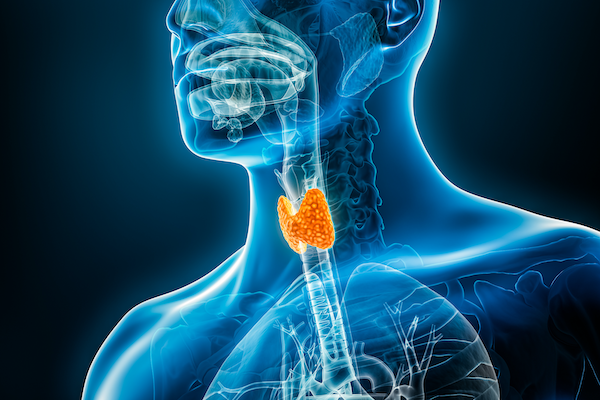Thyroid Cancer

Dr. Ranjit Kumar Padhiari
Head & Neck Cancer Specialist
Thyroid Cancer

Thyroid cancer is a malignant condition that originates in the thyroid gland situated in the neck. This cancer emerges when thyroid cells undergo abnormal growth, resulting in the formation of tumors. Although relatively uncommon, it ranks among the most prevalent cancers affecting the endocrine system. Thyroid cancer is typically treatable, particularly when diagnosed at an early stage. It may manifest with symptoms such as a painless neck lump, voice changes, or difficulty swallowing. Diagnosis involves physical examinations, medical imaging (e.g., ultrasound), and biopsies. Treatment options, including surgery, radioactive iodine therapy, and thyroid hormone replacement, are contingent upon the type and stage of the cancer. Timely diagnosis and suitable treatment are critical for achieving better outcomes.
Symptoms:
- Lump or Nodule: The most frequent indication of thyroid cancer is the presence of a painless lump or nodule in the neck. These lumps may sometimes be self-detected or uncovered during routine medical check-ups.
- Neck Swelling: As the thyroid cancer tumor grows, it can lead to noticeable swelling in the neck, often more prominent on one side.
- Neck or Ear Pain: Some individuals with thyroid cancer experience neck or ear discomfort, though this symptom may not be present in all cases.
- Voice Changes: Thyroid cancer can impact the vocal cords, resulting in hoarseness or changes in one’s voice. Persistent voice changes, especially in non-smokers, warrant investigation.
- Difficulty Swallowing: Large thyroid tumors can obstruct the swallowing process, causing discomfort and a sensation of a lump in the throat.
- Coughing or Breathing Problems: In rare instances, thyroid cancer may extend into the airway, causing coughing or breathing difficulties, which is more commonly associated with the highly aggressive anaplastic thyroid cancer.
Diagnosis:
- Physical Examination: Healthcare providers examine the thyroid gland for nodules or irregularities during a physical examination. If a nodule is detected, further evaluation is necessary.
- Imaging Tests: Detailed images of the thyroid gland are obtained through ultrasound, computed tomography (CT) scans, and magnetic resonance imaging (MRI) scans, aiding in assessing nodule or tumor characteristics.
- Fine-Needle Aspiration (FNA) Biopsy: FNA biopsy involves using a thin needle to collect a tissue sample from a thyroid nodule. This sample is examined under a microscope to identify cancer cells.
- Blood Tests: While not a direct diagnostic method for thyroid cancer, blood tests measure thyroid hormone levels, providing insight into overall thyroid function.
Risk Factors:
- Gender: Thyroid cancer is more prevalent in women than in men, with women being three times more likely to develop the disease.
- Age: The risk of thyroid cancer increases with age, with the highest incidence occurring in individuals between 30 and 60 years old.
- Family History: A family history of thyroid cancer, particularly in first-degree relatives (parents, siblings), increases the risk.
- Radiation Exposure: Exposure to ionizing radiation, especially during childhood, is a significant risk factor. This includes radiation therapy for head and neck cancers and radiation exposure from nuclear accidents.
- Dietary Iodine: Diets with either insufficient or excessive iodine intake may be associated with an increased risk of thyroid cancer, emphasizing the importance of balanced iodine intake.
Types:
- Papillary Thyroid Cancer: Accounting for approximately 80% of all cases, this type is typically slow-growing and highly treatable.
- Follicular Thyroid Cancer: Representing 10-15% of thyroid cancers, it tends to stay confined within the thyroid but can be more aggressive than papillary cancer.
- Medullary Thyroid Cancer: Originating in parafollicular cells or C cells, this cancer accounts for about 4% of thyroid cancers and can spread to lymph nodes and other areas.
- Anaplastic Thyroid Cancer: This rare and extremely aggressive form does not respond well to treatment.
- Thyroid Lymphoma: Affecting the lymphatic system within the thyroid, this is a rare subtype of thyroid cancer.
Staging of Thyroid Cancer:
Thyroid cancer is typically staged using the American Joint Committee on Cancer (AJCC) TNM system, which considers the tumor (T), lymph nodes (N), and distant metastasis (M).
- Stage 0: Cancer is confined to the thyroid without invasion or spread.
- Stage I: The tumor is small and limited to the thyroid.
- Stage II: The tumor is larger but still contained within the thyroid.
- Stage III: Cancer may be any size but has extended beyond the thyroid.
- Stage IVA: Cancer has spread to nearby lymph nodes.
- Stage IVB: Cancer has spread to lymph nodes in the upper chest.
- Stage IVC: Cancer has spread to distant sites or organs (metastasis).
Staging guides treatment decisions and provides insight into prognosis.
Treatment:
- Surgery (Thyroidectomy): The primary treatment typically involves surgically removing the thyroid gland or the affected portion.
- Radioactive Iodine (RAI) Therapy: After surgery, RAI therapy may be used to eliminate remaining cancer cells, as they selectively absorb radioactive iodine.
- External Beam Radiation: Employed for aggressive, recurrent, or inoperable thyroid cancer, this treatment uses high-energy X-rays to target and destroy cancer cells.
- Thyroid Hormone Replacement: Following a total thyroidectomy, levothyroxine medication is prescribed to replace the hormones typically produced by the thyroid.
- Chemotherapy: Reserved for advanced or aggressive cases, chemotherapy is not the first-line treatment for thyroid cancer.
Prevention and Risk Reduction:
- Iodine Intake: Maintaining a diet with adequate but not excessive iodine is vital for overall thyroid health. Most developed countries offer iodized salt to prevent iodine deficiency.
- Limit Radiation Exposure: Reducing exposure to ionizing radiation, especially during medical procedures, is essential. Discuss potential risks and benefits with healthcare providers.
- Regular Check-ups: Regular visits to healthcare providers for thyroid examinations are crucial, particularly with a family history of thyroid cancer. Early detection is key to better outcomes.
Conclusion: Thyroid cancer encompasses various types and presentations. Early detection and appropriate treatment are pivotal for optimal outcomes. If you have concerns about thyroid health or experience symptoms, consult a healthcare professional for a comprehensive evaluation and personalized guidance.

